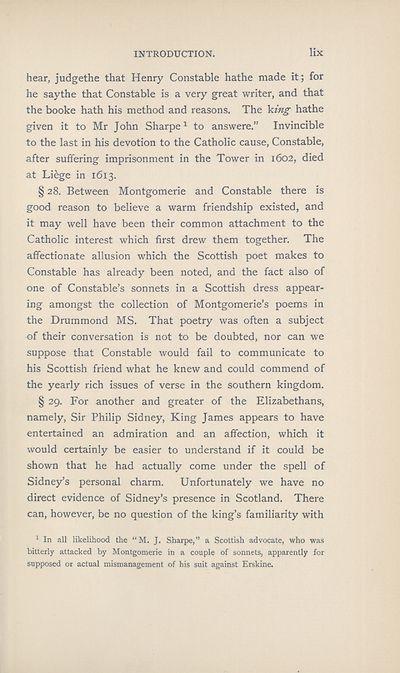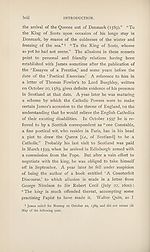Download files
Complete book:
Individual page:
Thumbnail gallery: Grid view | List view

INTRODUCTION.
lix
hear, judgethe that Henry Constable hathe made it; for
he saythe that Constable is a very great writer, and that
the booke hath his method and reasons. The "king hathe
given it to Mr John Sharpe1 to answere.” Invincible
to the last in his devotion to the Catholic cause, Constable,
after suffering imprisonment in the Tower in 1602, died
at Liege in 1613.
§ 28. Between Montgomerie and Constable there is
good reason to believe a warm friendship existed, and
it may well have been their common attachment to the
Catholic interest which first drew them together. The
affectionate allusion which the Scottish poet makes to
Constable has already been noted, and the fact also of
one of Constable’s sonnets in a Scottish dress appear¬
ing amongst the collection of Montgomerie’s poems in
the Drummond MS. That poetry was often a subject
of their conversation is not to be doubted, nor can we
suppose that Constable would fail to communicate to
his Scottish friend what he knew and could commend of
the yearly rich issues of verse in the southern kingdom.
§ 29. For another and greater of the Elizabethans,
namely, Sir Philip Sidney, King James appears to have
entertained an admiration and an affection, which it
would certainly be easier to understand if it could be
shown that he had actually come under the spell of
Sidney’s personal charm. Unfortunately we have no
direct evidence of Sidney’s presence in Scotland. There
can, however, be no question of the king’s familiarity with
1 In all likelihood the “M. J. Sharpe,” a Scottish advocate, who was
bitterly attacked by Montgomerie in a couple of sonnets, apparently for
supposed or actual mismanagement of his suit against Erskine.
lix
hear, judgethe that Henry Constable hathe made it; for
he saythe that Constable is a very great writer, and that
the booke hath his method and reasons. The "king hathe
given it to Mr John Sharpe1 to answere.” Invincible
to the last in his devotion to the Catholic cause, Constable,
after suffering imprisonment in the Tower in 1602, died
at Liege in 1613.
§ 28. Between Montgomerie and Constable there is
good reason to believe a warm friendship existed, and
it may well have been their common attachment to the
Catholic interest which first drew them together. The
affectionate allusion which the Scottish poet makes to
Constable has already been noted, and the fact also of
one of Constable’s sonnets in a Scottish dress appear¬
ing amongst the collection of Montgomerie’s poems in
the Drummond MS. That poetry was often a subject
of their conversation is not to be doubted, nor can we
suppose that Constable would fail to communicate to
his Scottish friend what he knew and could commend of
the yearly rich issues of verse in the southern kingdom.
§ 29. For another and greater of the Elizabethans,
namely, Sir Philip Sidney, King James appears to have
entertained an admiration and an affection, which it
would certainly be easier to understand if it could be
shown that he had actually come under the spell of
Sidney’s personal charm. Unfortunately we have no
direct evidence of Sidney’s presence in Scotland. There
can, however, be no question of the king’s familiarity with
1 In all likelihood the “M. J. Sharpe,” a Scottish advocate, who was
bitterly attacked by Montgomerie in a couple of sonnets, apparently for
supposed or actual mismanagement of his suit against Erskine.
Set display mode to: Large image | Zoom image | Transcription
Images and transcriptions on this page, including medium image downloads, may be used under the Creative Commons Attribution 4.0 International Licence unless otherwise stated. ![]()
| Publications by Scottish clubs > Scottish Text Society publications > Old series > Poems of Alexander Montgomerie > (69) |
|---|
| Permanent URL | https://digital.nls.uk/110170877 |
|---|
| Description | A collection of over 100 Scottish texts dating from around 1400 to 1700. Most titles are in Scots, and include editions of poetry, drama, and prose by major Scottish writers such as John Barbour, William Dunbar, Gavin Douglas, and George Buchanan. Edited by a key scholarly publisher of Scotland's literary history, and published from the late 19th century onwards by the Scottish Text Society. Available here are STS series 1-3. |
|---|

